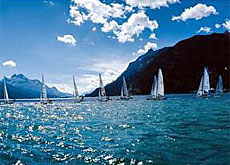
Switzerland sails on in sea of competitiveness

The IMD business school in Lausanne says Switzerland is "sailing ahead" in the world competitiveness rankings, gaining two places this year to come in sixth.
According to the World Competitiveness Yearbook 2007, Switzerland is among the countries most successful in catching up with the number one competitive nation, the United States.
But the IMD questions how long Switzerland will be able to ride the favourable seas to keep among the leaders of the pack.
Hard on the heels of the US come Singapore, Hong Kong, Luxembourg and Denmark.
“I think Switzerland has had a very good year. The economy has been growing very well at 2.2 per cent, which is historically very good for us,” commented Stéphane Garelli, a professor at IMD and Lausanne University, who is director of the World Competitiveness Center.
“We have to acknowledge the fact that this is essentially one of the consequences of the very good performance of the global economy,” he told swissinfo.
Garelli noted that this was the first time in the yearbook that all 55 countries analysed had shown economic growth, the average being five per cent.
Employment
Switzerland’s “excellent” economic performance – second for the current account balance and fourth for the employment rate, unemployment and direct investment flows had a strong impact on its ranking.
“Regarding the employment level – and we sometimes forget about that – Switzerland is giving work to a very significant amount of the population, a much larger proportion than France or Germany.
“And despite the fact that Switzerland is growing, inflation is very much under control – so for the moment all the lights are green,” Garelli said.
But there are weaknesses, for example high wages, costs, attractiveness for foreign companies and a slow decision-making system in the country because of its direct democracy.
“Certain companies are suffering from a system which is very slow in the way it operates, and I think this is a very big issue,” Garelli said.
Recipe for success
Another point he makes is that Switzerland’s “recipe for success” is being copied by other nations, for example by Singapore in wealth management.
Although a lot of Swiss banks and institutions are present in Singapore and taking advantage of being there, success in a global and open world can be easily copied and puts some additional pressure on Switzerland.
The figures in the yearbook reveal that while Switzerland had one of the best economic growth rates in its history last year, the country ranks 50th in the world.
In particular China (10.7 per cent), India (9.2 per cent) and Singapore (7.9 per cent) forged ahead.
“We are confronted with a very dynamic growth elsewhere and to a certain extent I think one of the challenges of Switzerland is to try at least to have higher growth rates than we have now,” Garelli said.
swissinfo, Robert Brookes
World Competitiveness Yearbook rankings:
1) United States (Rank 2006: 1)
2) Singapore (3)
3) Hong Kong (2)
4) Luxembourg (9)
5) Denmark (5)
6) Switzerland (8)
7) Iceland (4)
8) Netherlands (15)
9) Sweden (14)
10) Canada (7)
Switzerland topped the global competitiveness rankings of the Geneva-based World Economic Forum (WEF) in 2006.
Garelli pointed out that in the WEF report, opinion surveys (competitiveness perceived) represent about 80% of the results.
In the IMD report there are 323 criteria. Hard statistics (competitiveness measured) represent two-thirds of the overall results.
“We are focusing our methodology much more on competitiveness measured on what we feel is the reality of competitiveness much more than on opinion surveys or opinion polls, which can be obviously much more subjective and volatile. We think our methodology makes sense,” Garelli said.
Of the 55 countries analysed, 40 have increased or maintained their competitiveness vis-à-vis the US.
Only 15 (among them France, Italy and Brazil) have lost ground.
Switzerland has therefore improved its competitiveness over the long-term, and has eradicated some of the consequences of the “lost decade” (1993 – 2003) during which the economy stagnated.

In compliance with the JTI standards
More: SWI swissinfo.ch certified by the Journalism Trust Initiative









































You can find an overview of ongoing debates with our journalists here . Please join us!
If you want to start a conversation about a topic raised in this article or want to report factual errors, email us at english@swissinfo.ch.